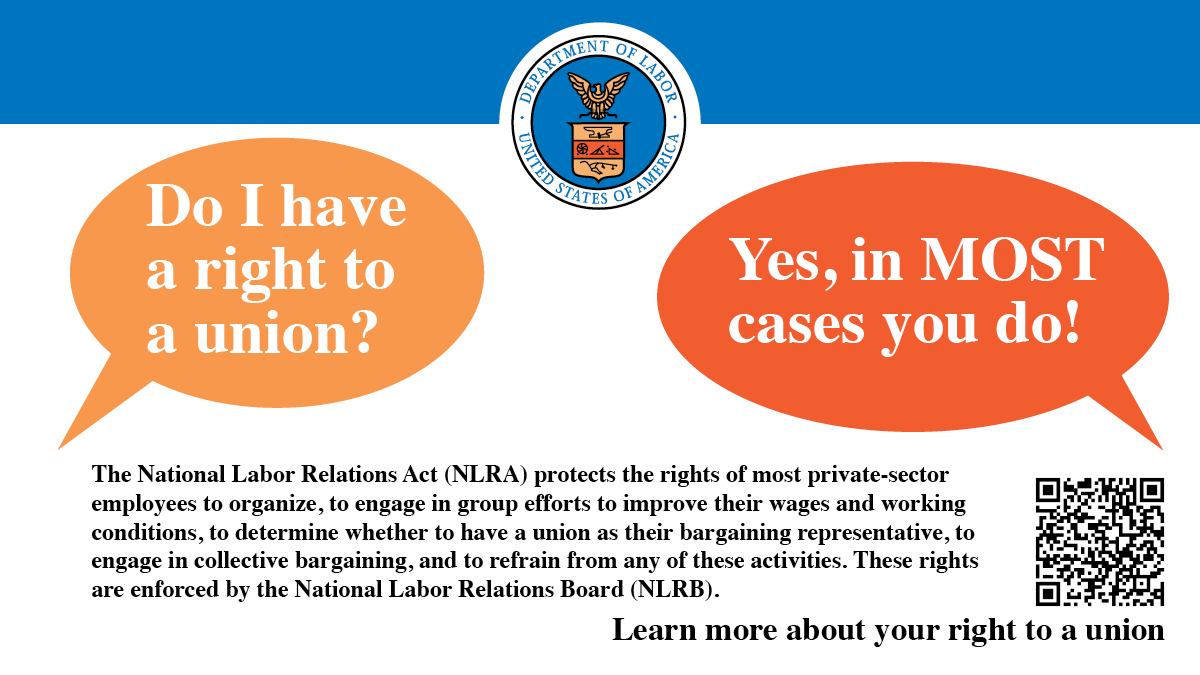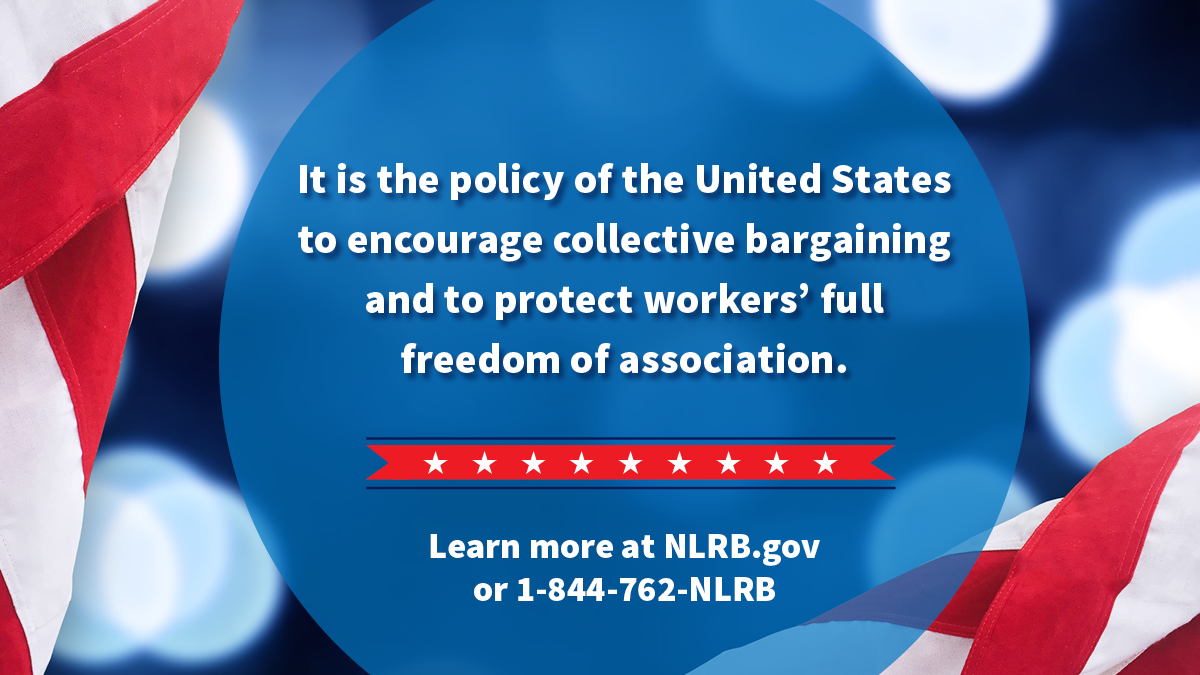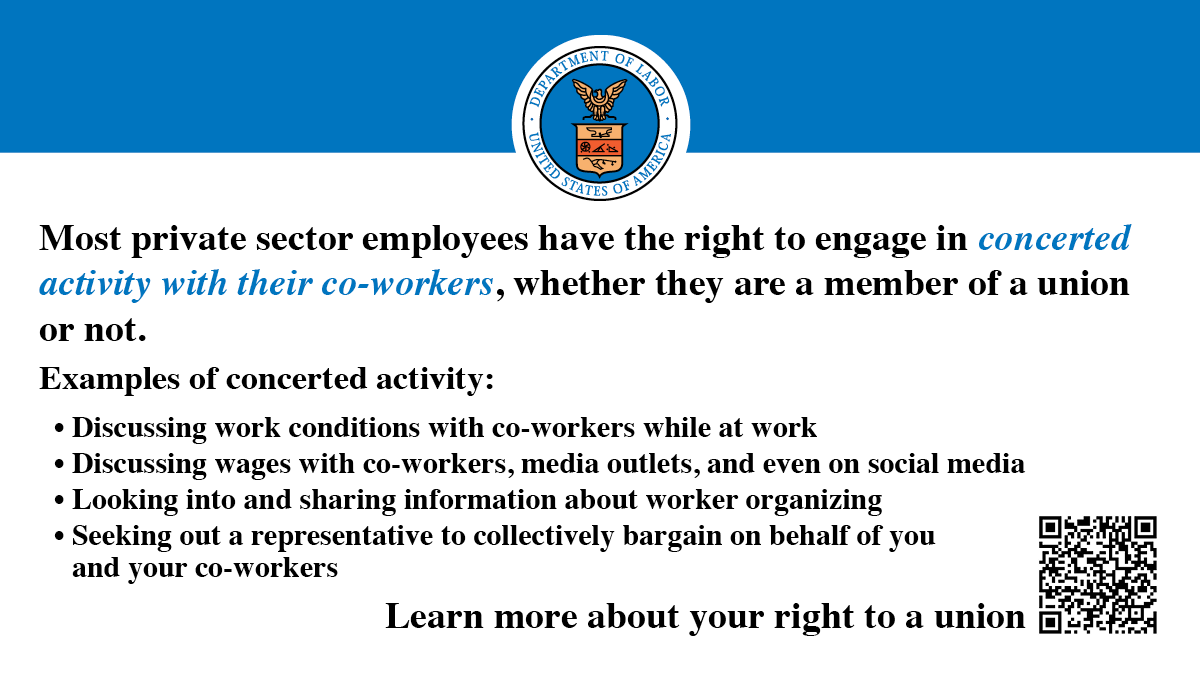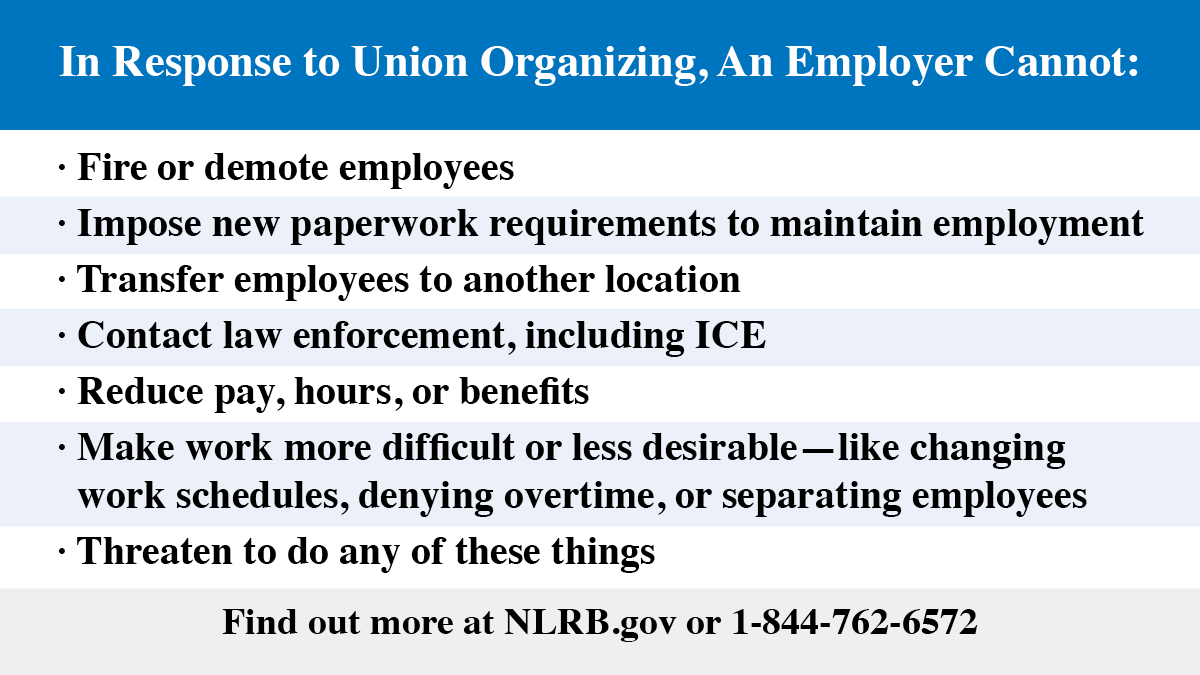Below are some key DOL social media resources and messages we’re sharing pertaining to the Know Your Rights toolkit and the WORK Center, a new website with information and resources on unions and collective bargaining.
DOL Social media information
Short
The U.S. Department of Labor recently launched several educational resources about workers’ rights to form and join a union. Learn more about workers’ right to form and join a union, and visit the Worker Organizing Resource and Knowledge (WORK) Center for more resources on unions and collective bargaining. This message is provided by the U.S. Department of Labor.
Long
Unions help the Department of Labor fulfill its mission to protect the health, safety, wages and retirement security of working Americans. Workers represented by unions feel safer voicing concerns about workplace safety and health, wage theft and other violations of worker protections. Unions help enforce workers’ legal rights. Unions help the Department of Labor fulfill its mission to protect the health, safety, wages and retirement security of working Americans.
The U.S. Department of Labor recently re-launched resources to help workers understand their rights and learn more about unions and collective bargaining:
This message is provided by the U.S. Department of Labor.





@USDOL‘s new Worker Organizing Resource and Knowledge Center website is a one-stop shop for information and resources on unions and collective bargaining:
—
Interested in joining a union? Here are some resources from @USDOL:
—
The U.S. Department of Labor’s new Worker Organizing Resource and Knowledge Center website is a one-stop shop for information and resources on unions and collective bargaining: WORKCenter.gov
—
Have you ever wondered what it takes to form a union? Or what the benefits of joining one are?
@USDOL‘s WORK Center website can help: WORKCenter.gov #UnionsMatter
—
Unions are in the news a lot these days, but many workers don’t know how to join or form one.
Start here with this resource from @USDOL: WORKCenter.gov #unionsmatter
—
🤔Have you ever wondered…
@USDOL has answers: WORKCenter.gov/what-is-a-union/
—
Worker and public support for unions is higher now than it’s been in decades—especially among young workers.
@USDOL‘s new WORK Center website is supporting this demand: WORKCenter.gov
—
DYK? Labor unions improve wages and working conditions for all workers–whether they are union members or not.
Learn more about why unions are important from @USDOL: WORKCenter.gov/why-are-unions-important/
—
Did you know that the National Labor Relations Act protects the rights of most private sector employees to form and join a union? Find out more about union organizing and collective bargaining from @USDOL here: https://blog.dol.gov/2022/09/12/you-have-the-right-to-form-and-join-a-union
—
Most private sector employees have the right to engage in concerted activity with their co-workers, whether they are a member of a union or not. Learn more from @USDOL: https://blog.dol.gov/2022/09/12/you-have-the-right-to-form-and-join-a-union
—
Are you trying to organize your co-workers and facing retaliation by your boss? @USDOL has helpful information prepared by the NLRB on what your employer can and cannot do during a union organizing campaign.
—
Did you know that being in a union generally means higher pay, improved benefits, better health and safety protections, and more? More from @USDOL: WORKCenter.gov
—
Think your workplace rights have been violated? Worker.gov is a newly updated website from @USDOL with information and resources about key workplace rights and what to do if facing retaliation. Visit www.worker.gov
—
Unions improve job security and benefits, advocate for safer workplaces, and improve the well-being of workers. In most cases, YOU have the right to form and join a union. More from @USDOL: https://blog.dol.gov/2022/09/12/you-have-the-right-to-form-and-join-a-union-0
—
Most workers have a right under federal law to discuss wages, benefits, and work conditions with co-workers. This means employers can’t fire, discipline, or penalize those workers for those activities. Learn more about your workplace rights at @USDOL‘s Worker.gov
—
60 million non-union workers in the US say they would join a union if given the chance, but many don’t know where to begin. @USDOL has created the Worker Organizing Resource and Knowledge (WORK) Center with information on unions, collective bargaining, and so much more. WORKCenter.gov
—
Unions improve wages and working conditions for all workers, whether they are union members or not. @USDOL offers more information here: WORKCenter.gov/why-are-unions-important/
—
Unions help reduce wage gaps for women workers and workers of color. Find out more here from @USDOL: WORKCenter.gov/why-are-unions-important/
—
Want to exercise your voice with your co-workers? Most workers have a right to form and join a union. Employers have a legal duty to bargain in good faith with their employees’ union and to sign any collective bargaining agreement that has been reached. Learn more from @USDOL here: www.WORKCenter.gov
Who can join a union? How do I begin organizing? What can my employer do during a union organizing effort?
Learn more about all your workplace rights at the U.S. Department of Labor’s Worker Organizing Resource and Knowledge (WORK) Center– a one-stop shop for information and resources on unions and collective bargaining for workers, employers, unions, government agencies, students, and anyone interested in unions and collective bargaining. Find more at WORKCenter.gov
—
Unions and employers work together to improve workplaces. Workers who exercise their right to form and join a union cannot be retaliated against.
Worker.gov is a newly updated website from the U.S. Department of Labor with information on your workplace rights, voicing safety concerns, and more. Think you may be facing retaliation for exercising your right to organize? Learn how to report or address the issue at worker.gov
—
Did you know that most workers have the right to join with coworkers to improve wages and working conditions, even if they are not union members?
Learn more about the right to form and join a union from the U.S. Department of Labor here: https://blog.dol.gov/2022/09/12/you-have-the-right-to-form-and-join-a-union-0
60 million non-union workers in the U.S. say they would join a union if given the chance, but many don’t know where to begin.
Our new Worker Organizing Resource and Knowledge (WORK) Center is a one-stop shop for information and resources on unions and collective bargaining for workers, employers, unions, government agencies, students and anyone interested in unions and collective bargaining: WORKCenter.gov #LaborDay
—
Union members tend to have higher wages, improved job security and benefits, and safer workplaces. Interested in forming or joining a union? Find resources and information at the Worker Organizing Resource and Knowledge (WORK) Center— a one-stop shop from the U.S. Department of Labor for information about collective bargaining, union organizing, and workplace rights. WORKCenter.gov
—
Did you know that most workers have a right to join with coworkers to improve wages and working conditions, even if they are not union members? Visit worker.gov to find out more about the federal labor laws that protect you and how to proceed if these rights have been violated.